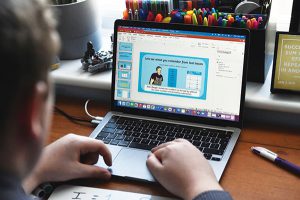Since the start of the pandemic, online learning has become far more common — and so have online examinations. Typically, the examination software also proctors the test, observing with the student’s own camera. Does this process violate the Constitution?
A federal judge in Ohio decided last week that at least in some circumstances, the answer is yes. The court’s impeccable reasoning should give us pause about the project of online proctoring.
The problem of surveillance in what’s been called “the constant and expanding classroom†predates Covid-19 and is as severe in grade school as in colleges and universities. But unlike teens and toddlers, college students are adults, clothed in the full regalia of constitutional protections. And the issue isn’t going away anytime soon. The global market for examination proctoring software is expected to reach $1.5 billion by 2028. The U.S. is the biggest user and developer. So while the decision applies of course only to public universities, the outcome matters.
The plaintiff, a student named Aaron Ogletree, alleged that Cleveland State University violated the Fourth Amendment when, before sitting for a test, he was asked to allow remote proctoring software to scan his surroundings in search of “potential impermissible study aids or notes.†According to the complaint, when the email request arrived just before the test in question, Ogletree had confidential tax documents in view that there was no time to shield. The scan was recorded. A copy was kept by the vendor, and the scan was also available to his fellow students. This process, he argued, violated his Fourth Amendment right to be free of unreasonable searches and seizures.
The court agreed. In its decision, it rejected the university’s analogies to cases that have carved out exceptions for items that are in plain view from places where the public routinely goes. A computer’s cameras, the court wrote, “go where people otherwise would not, at least not without a warrant or an invitation.â€
The school further argued that, in effect, everybody uses remote proctoring now. The judge was unmoved: “The ubiquity of a particular technology or its applications does not directly bear on that analysis.†In the court’s view, the “very core†of the Fourth Amendment is the right to be free of governmental intrusion in the home; the proctoring scan “occurred in Plaintiff’s house, in his bedroom, in fact.â€
One might respond to all this by saying that if Ogletree didn’t like the proctoring policies, he should have enrolled somewhere else, or perhaps taken a course that didn’t require the scan. But the information necessary to make that decision was presented in a manner the court called “opaque.†And, of course, the pandemic left little choice in any case.
The court conceded that the school had a legitimate interest in the prevention of cheating, but found, on balance, that the proctoring scan was so intrusive and unreasonable that it violated the Fourth Amendment.
—Bloomberg
 The Gulf Time Newspaper One of the finest business newspapers in the UAE brought to you by our professional writers and editors.
The Gulf Time Newspaper One of the finest business newspapers in the UAE brought to you by our professional writers and editors.
